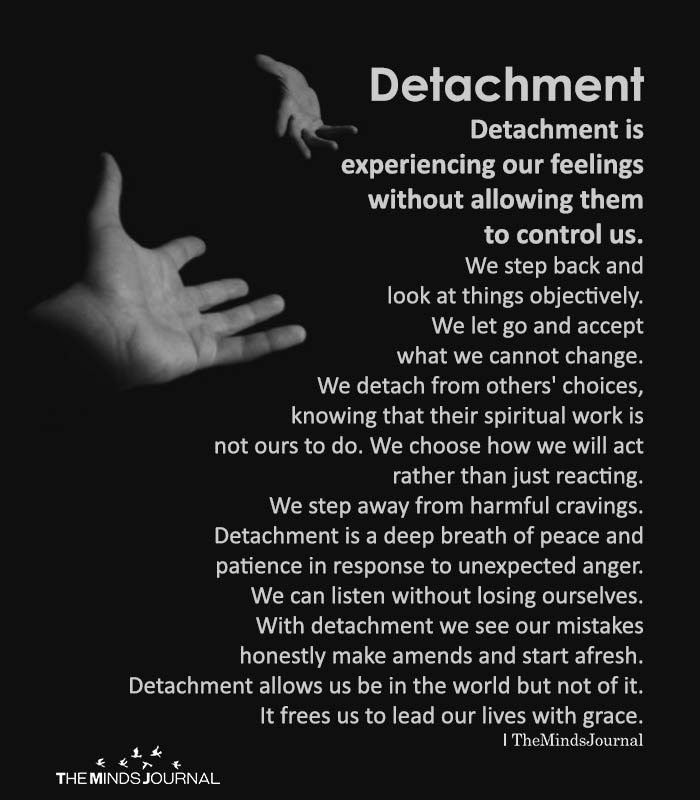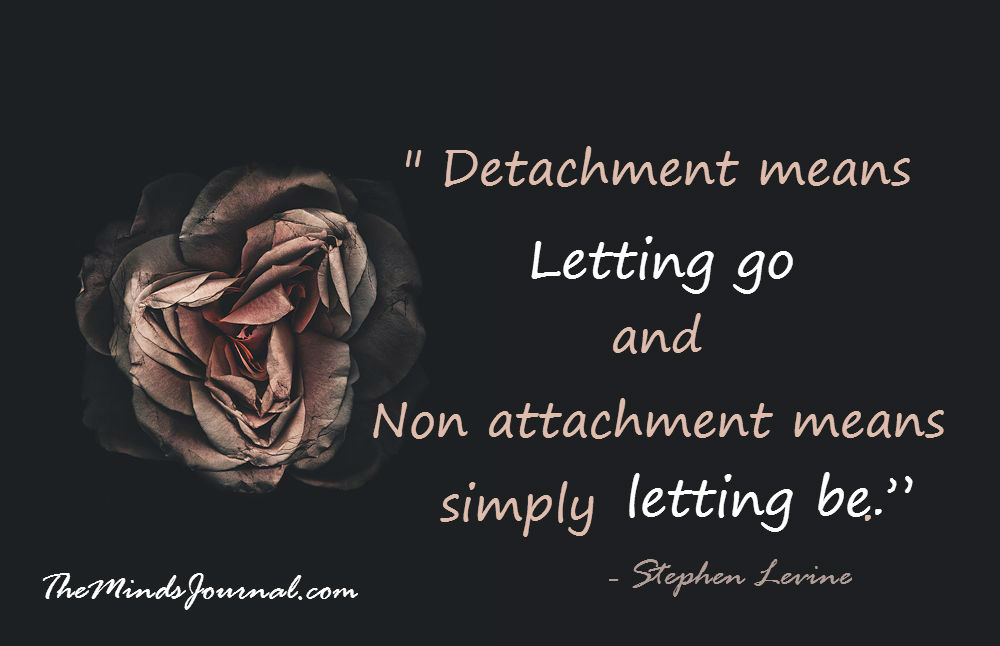The ability to let go of anything that disturbs your mind and your feelings is known as emotional detachment. It includes letting go of the past, as well as one’s fears, regrets, and negative thoughts. Learn how it protects us from unwanted drama, nervousness, or stress.
What is emotional detachment? You might have never heard about it, and if you did it, it is most probably that you have heard about its negative phase. When I speak about this topic, I refer to positive emotional detachment, and it has a positive phase. In its negative phase, it can mean lack of empathy, repression of the emotions and estrangement. I am not talking about this kind of emotional detachment.
I am talking about something else, about a positive quality, which is very useful in many situations. It can save you a lot of suffering, stress, and emotional upset.
What Is Emotional Detachment?
Let’s define detachment and talk about its positive meaning.
Detachment Definition
It is a state of inner calmness and poise, and the ability not to let what people say or do agitate you emotionally and disturb your state of mind.

This detachment skill, and it is a skill, helps you keep your poise in difficult situations, and enables you to avoid dwelling in the past and occupying your mind with negative thoughts. Positive emotional detachment is a skill, which can help you keep your mental and emotional poise and balance, and avoid taking things too personally.
Positive emotional detachment is not a state of indifference or passivity, and does not mean lack of interest or lack of feelings. True detachment is something else. It is an attitude of open-mindedness and of being practical.
Related: 15 Simple Ways You Can Boost Your Emotional Health
You can be loving, caring, interested in people, and yet keep a certain measure of detachment. This would protect you from becoming too attached for your own good, or emotionally drained by negative people.
People, who possess positive emotional detachment, keep their poise when they run into problems or trouble. They accept the good and the bad equally, because their minds are in a state inner balance and peace. They do not get upset, if their plans do not turn out as expected. They try again, or look for a new approach.
If they succeed, they are happy, and if they don’t, they will either try again, or forget the matter and move on to something else.
It is always good to be, to a certain degree, and emotionally detached person. This will save you a lot emotional burden, manipulation and unpleasant feelings. However, this should be accompanied by common sense, thinking, and not going to extremes.
Related: The Positive Reframe: #1 Way To Boost Your Courage And Resilience Today
Clarification About Positive Emotional Detachment
- Is not emotional numbing – It is a state of calmness.
- Does not make you shun relationships.
- Does not mean lack of emotions – It means the ability to avoid negative and disturbing emotions.
- Does not make you avoidance of emotional connection – It is the ability to stay calm and relaxed when in the company of stressful people.
The possession of this positive emotional detachment makes a person avoid stress, take care of his or her mental health, and keep healthier emotional connections. This affects personal relationships, day-to-day activities, and all aspects of life in a positive way.
Ask Yourself the Following Questions:
- Do you allow other people moods to affect your state of mind?
- Do you allow other people’s frustration, anger or emotions to affect you?
- How many times have you got emotionally involved with something against your will and better judgment?
- Do you get angry, frustrated or disappointed by trivial matters?
- Do you allow external matters to affect your state of mind and your feelings?
If you do, you need to develop a certain degree of detachment.
When it comes to personal matters, and to matters that involve the emotions, it is hard to avoid getting affected and emotionally involved.
It is difficult to stay calm when people criticize you or disrespect you. It is also difficult to stay calm when people speak about their problems or share their anxiety, stress or negative feeling with you. However, with some training, you can teach yourself to stay calm, positive and affected by negative words, feelings or situations.
This attitude is most useful in daily life, at work, in the pursuit of ambitions and career, and of course, on the self improvement and spiritual paths.
Situations That Require Positive Emotional Detachment
How do you feel, when somebody says something nasty or makes an unpleasant comment? You would probably become angry, unhappy, or feel hurt. This happens because you let others people’s thoughts, words and actions affect your state of mind, your actions and your reactions.
On the other hand, if you are able to stay detached, you will not be upset and disturbed. You will stay calm and would not waste hours thinking about their words.
- Do you spend hours thinking about hurts, bad memories, and failure, instead of finding ways to avoid these feelings?
- Do you allow yourself to be pulled into emotional thinking, worries, and fears, instead of detaching yourself from them?
- How much time and energy do you waste every day, brooding on useless thoughts and feelings, due to lack of detachment? Much of the anger, frustration, unhappiness, and disappointments are due to a lack of detachment.
- While working, reading or walking, and during other activities, we often keep thinking about people, and situations that have hurt us. This is not a useful activity and is a waste of time and energy.
- Do you practice meditation? During meditation, an endless number of thoughts keep coming into the mind, attracting attention, and awakening associated thoughts and emotions. This makes you forget the meditation and follow your thoughts. However, if you can display detachment toward your thoughts, it would be easier to ignore them.
Related: The Positive Reframe: #1 Way To Boost Your Courage And Resilience Today
You can prevent yourself from getting involved in these situations and being affected by them, when you develop the ability to detach yourself from them. This is positive emotional detachment. It is a way to protect your mental and emotional well-being.
- It is a most useful skill when driving, since it helps you stay calm when you find yourself in a traffic jam, and when someone cuts your lane.
- It is useful, when someone criticizes you or when someone treats you rudely. It helps you keep your composure and control your reactions in these situations.
- It also helps you avoid resentment and holding grudges, because you rise above these feelings.
These are just a few of the many situations, where positive emotional detachment can be of great use. Remember, I am referring its positive phase, where it is useful and can save you time and energy.
Related: How to Stop Granting Emotional Energy To An Abuser: This Works Better Than Grey Rock
Additional Definitions And Meanings Of Detachment
Emotional detachment means letting go, to let go of negative feelings, thoughts, and memories. It means letting go of anger and resentment and forgetting your frustrations, disappointments, and failures.

In simple words, it means freedom from attachment to anything that harms and hurts you. It means adopting a calm, happy and balanced state of mind. You are not repressing anything or hurting anyone when expressing this skill in the right, positive way.
When you possess this skill, you are in a better position to help or advice people, because you become a calm and relaxed person, use your common sense and reason, and do not respond and react with anger.
You can develop this useful skill with simple training. In my book about this topic I offer guidance and advice for developing this useful skill, which anyone can follow and practice.
Are you ready to practice positive emotional detachment?
Written by: Remez Sasson
Originally appeared on: Successconsciousness.com
Republished with permission.










Leave a Reply